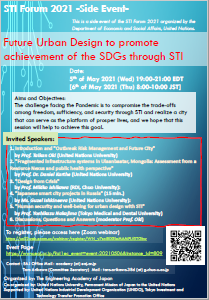Department of Economic and Social Affairs, United Nations主催「STIフォーラム」のサイドイベントです
開催日:2021年5月6日(木)8:00~10:00
・申込はこちら / Click here to register(Zoom webinar)
・問い合わせ先:EAJ事務局 / EAJ Office
Mail : academy (at) eaj.or.jp
有川太郎(幹事)/ For inquiries : Taro Arikawa
Mail:taro.arikawa.38d (at) g.chuo-u.ac.jp
主催:公益社団法人日本工学アカデミー
共催:国連大学、国際連合日本政府代表部
後援:国際連合工業開発機関(UNIDO) 東京投資・技術移転促進事務所
※ 詳細はこちら / Click here for details (PDF 660KB)
※ STI Forum 2021 公式サイトはこちら(https://sdgs.un.org/tfm/STIForum2021)
”Future Urban Design to promote achievement of the SDGs through STI”
There has been an outbreak of a COVID-19, which in its typical form threatens human security. This outbreak was primarily caused due to the rapid spread of the highly contagious virus among globally linked cities, which led to widespread and prolonged lockdowns in cities worldwide. According to United Nations, this Pandemic led to a rise in the unemployment rate and the first increase in poverty globally since 1998.
Urban areas developed rapidly in the 20th century, and according to DESA, 68% of the world's population, that is 6.7 billion people, are expected to live in urban areas by 2050. Furthermore, the NUA2020 shows that living in cities contributes to economic prosperity, environmental conservation, and social equality. Therefore, it is urgent to consider how urban areas can develop sustainably under infectious diseases to ensure human security. The pandemic also makes us recognize that it is essential to consider the well-being of residents as well as ensure human security in cities, as there were many cases of mental health problems caused by long-term lockdowns. In this session, we propose a new urban design that enables sustainable development while ensuring comfort during normal times and Decent Living Standards (DLS) during outbreaks.
The committee for Science, Technology, and Innovation in 2050 (STI2050) under the Engineering Academy of Japan (EAJ) has been discussing how to recover better in green after this situation and preparing an insight report. This session will introduce a part of preliminary insights of the report, and potentially contribute for the STI forum through vision and policy makings from national, urban, and infrastructure planning perspectives incorporated with human dimension.
The Pandemic makes many engineers return to basics to guide our way of thinking. For example, does materialistic prosperity ensure happiness or well-being? What is most important to us as human beings? What is the final destination of engineering—the true objective of engineering?
Besides, we realized that the engineers are responsible for working together across disciplines to build a resilient and sustainable system that will prevent the entire city from disrupting at once, no matter the situation.
The challenge facing the Pandemic is to compromise the trade-offs among freedom, comfort, and security through STI and realize a city that can serve as the platform of prosper lives, and we hope that this session will help to achieve this goal.
The followings are our recommendations, and this session will focus on them.
1) Create a human-centered city that pursues well-being and aims to ensure comfort in usual and the Decent Living Standards during outbreaks.
2) Realize a city that ensures human security and well-being under any circumstances by achieving an autonomous and decentralized urban cluster structure without disrupting the current urban structure.
3) Develop a system to autonomously manage an entire city with humans and AI's cooperation by connecting diverse data between urban clusters.
Invited Speakers:
1. Introduction and "Outbreak Risk Management and Future City"
by Prof. Taikan Oki (United Nations University)
2. "Fragmented infrastructure systems in Ulaanbaatar, Mongolia: Assessment from a Resource Nexus and public health perspective"
by Prof. Dr. Daniel Karthe(United Nations University)
3. "Design from Crisis"
by Prof. Mikiko Ishikawa (RDI, Chuo University):
4. "Japanese smart city projects in Russia" (15 min.)
by Ms. GuzelIshkineeva(United Nations University):
5. "Human security and well-being for urban design with STI"
by Prof. Yoshikazu Nakajima (Tokyo Medical and Dental University)
6. Discussions, Questions and Answers (moderator Prof. Oki)
Organizer: The Engineering Academy of Japan
Organizing partners: United Nation University, Tokyo Office of the United Nation Industrial Development Organization, Permanent Mission of Japan to the United Nations
